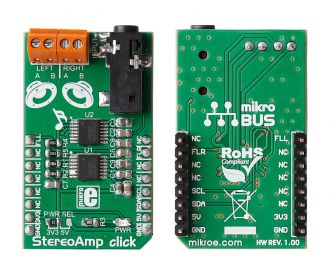
We strongly encourage users to use Package manager for sharing their code on Libstock website, because it boosts your efficiency and leaves the end user with no room for error. [more info]

Rating:
Author: MIKROE
Last Updated: 2019-04-02
Package Version: 1.0.0.1
mikroSDK Library: 1.0.0.0
Category: Amplifier
Downloaded: 5046 times
Not followed.
License: MIT license
StereoAmp click functions as a stereo amplifier and is ideal for battery powered devices. It features two LM48100Q-Q1 Boomer ICs by Texas Instruments.
Do you want to subscribe in order to receive notifications regarding "StereoAmp click" changes.
Do you want to unsubscribe in order to stop receiving notifications regarding "StereoAmp click" changes.
Do you want to report abuse regarding "StereoAmp click".

Library Description
The library covers all the necessary functions to control StereoAmp Click board. A library has drivers for set volume, enable and disable amplifier function, set mute mode function, set the fault detection control function, set the mode function, etc.
Key functions:
Examples description
The application is composed of three sections:
void applicationTask()
{
mikrobus_logWrite( " Gain 1,5 dB ", _LOG_LINE );
stereoamp_setVolume( _STEREOAMP_GAIN_1_5dB );
Delay_ms( 10000 );
mikrobus_logWrite( "-----------------------", _LOG_LINE );
mikrobus_logWrite( " Gain -13,5 dB ", _LOG_LINE );
stereoamp_setVolume( _STEREOAMP_GAIN_NEG_13_5dB );
Delay_ms( 10000 );
mikrobus_logWrite( "-----------------------", _LOG_LINE );
}
Other mikroE Libraries used in the example:
I2CUART​Additional notes and informations
Depending on the development board you are using, you may need USB UART click, USB UART 2 click or RS232 click to connect to your PC, for development systems with no UART to USB interface available on the board. The terminal available in all MikroElektronika compilers, or any other terminal application of your choice, can be used to read the message